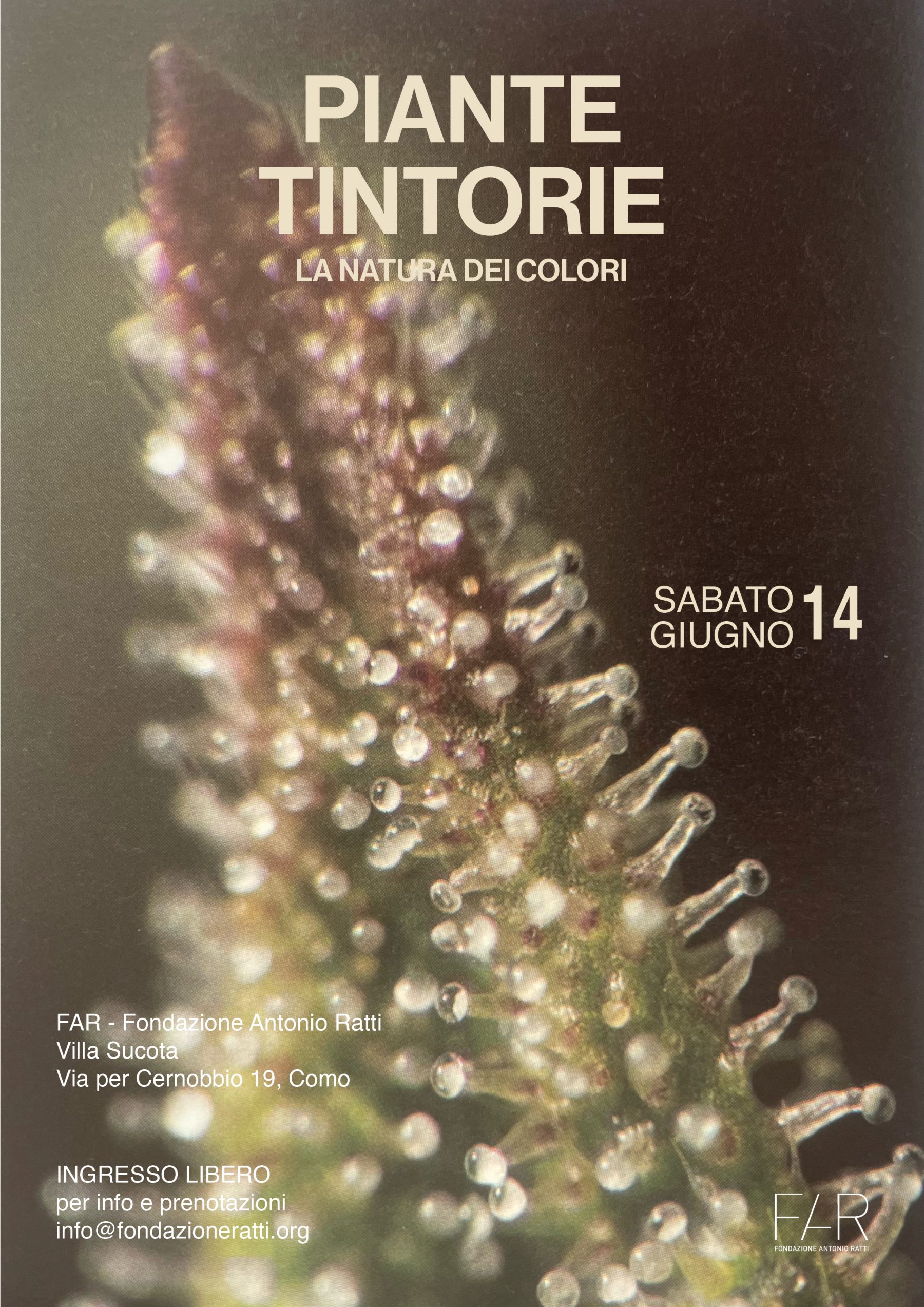Yto Barrada, Isa Rodrigues, Anne Varichon, Dominique Cardon, Silvia Zublena
Piante tintorie. La natura dei colori
STUDY DAYS
14 June 2025
FAR - Villa Sucota
Opening a new project dedicated to the cultivation, harvesting and use of dyeing plants and taking place in the park of Villa Sucota, the study day will host a series of talks presenting natural dyeing techniques from different perspectives. The diverse world of dyeing plants will be explored in respect of its ecological, social, artistic and community values, encouraging the rediscovery of traditional practices and investigating their potential.
Lecturers: Anne Varichon (historian and anthropologist of colour); Dominique Cardon (historian and anthropologist expert in natural dyes); Yto Barrada (artist); Isa Rodrigues (artist); Silvia Zublena (agronomist and head of the Botanical Garden of Pisa).
Programme:
h10
We are the heirs of a history of colour of which nuanciers are the actors and witnesses
Anne Varichon
Resonating with the large collection of sample books preserved in the Fondazione Antonio Ratti, the talk will focus on colour sampling. The theme, to which Anne Varichon dedicated her doctoral thesis and some fifteen years of research, will be complemented by the presentation of anthropological data, as the history of colour sampling and the histories of the uses, actors and thought on colour are closely linked.
The lecture will be held in French with simultaneous translation into Italian via headphones
h11
Culture of colour: the dyers' books. A precious heritage and a source of inspiration for the present
Dominique Cardon
With the emergence of a society increasingly aware of the environmental challenges facing the planet and of a new ‘green economy’, natural dyes, used by cultures all over the world since prehistoric times, are arousing new interest thanks to their chromatic richness, the biological benefits present in most of them and their potential applications in various industrial sectors, especially textiles. Dominique Cardon, a historian and archaeologist specialising in textile techniques and natural dyes, will take stock of the precious knowledge transmitted by the 17th century Languedoc dyers' books accompanied by samples of dyed fabrics. Experimental archaeology and colometrics will complement the analyses of dyes to demonstrate the relevance of the dyeing regulations of the time of Louis XIV and Colbert.
The lecture will be held in French with simultaneous translation into Italian via headphones
h12:30
Light lunch
h14
The Mothership
Yto Barrada e Isa Rodriguez
The Mothership is a non-profit art project created in Tangier by Yto Barrada to provide space and time for research and artistic exploration on natural dyes. The project aims to be an eco-campus to cultivate dyeing plants and create natural dyes, giving importance to indigenous traditions and creating space for experimental collective practices through residencies and workshops.
The presentation will discuss how direct contact with dyeing materials can serve as a platform to reconnect with the natural world, encourage intergenerational co-learning and stimulate critical reflection on the sustainability, accessibility and cultural and material specificities of natural dyes.
A large part of the presentation will be devoted to the educational projects that have arisen in the context of The Mothership from its foundation to the present day.
The presentation will be held in English with simultaneous translation into Italian via headphones
h15
Botanical sources for dyeing: the case study of the Fondazione Antonio Ratti
Silvia Zublena
An agronomist by training, Silvia Zublena will talk about her experience in the world of natural dyes, her two degree theses, the travels and projects that
have brought her to Como. Her desire for the Foundazione merges with her passion for plants, their cultivation, the continuous search for seeds, cuttings and spaces suitable for dyeing species. Observation of the plants in the Villa Sucota park led her to make a study of what could be the raw materials for dyeing in the present (spontaneous collection) and in the future (cultivation). Projects such as this can be an inspiration to individuals or associations to promote a sustainable approach to the world of colours.
The study day will be live streamed on the Foundation's YouTube channel.
Simultaneous translation will only be available on site.
The day will end with a walk in the park to discover the dyeing plants.


